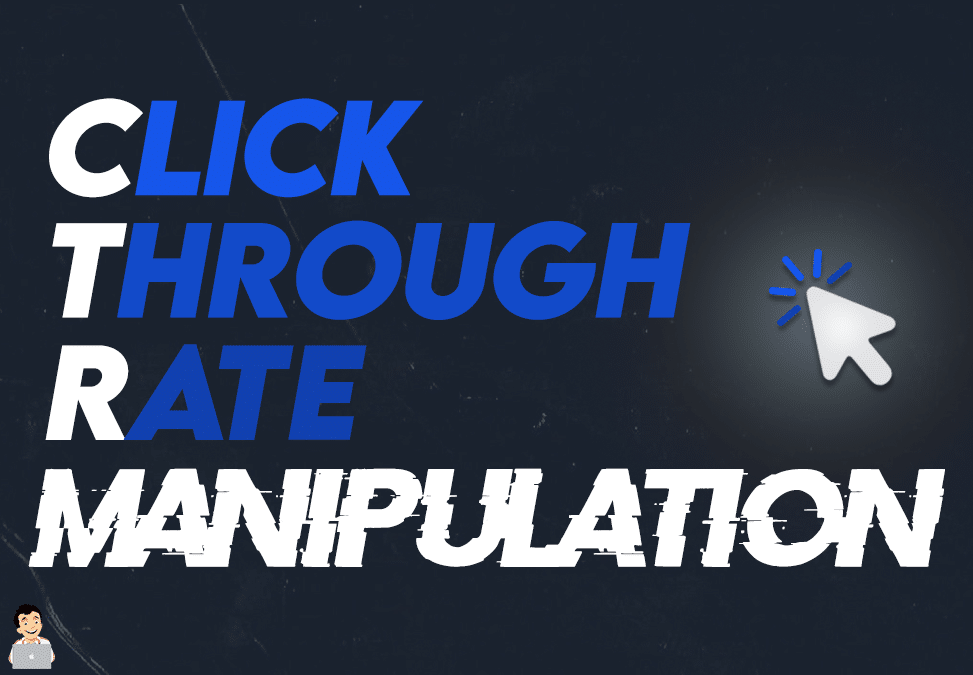Exploring the Partnership In Between CTR Manipulation Providers and User Behavior
In the world of digital advertising, the influence of click-through price (CTR) manipulation solutions on user habits stays a facility and fascinating topic. By exploring the complex relationship between CTR control services and user actions, appealing insights arise that may improve our understanding of electronic advertising and marketing methods and their effects on consumers.
Impact of CTR Manipulation on Actions
Examining the influence of Click-Through Rate (CTR) adjustment on customer behavior reveals essential insights into the characteristics of online engagement. CTR control includes unnaturally inflating the number of clicks on a specific web link or advertisement to trick users and internet search engine. This technique can cause an altered understanding of a website's popularity or importance, eventually influencing individual behavior.

In addition, CTR manipulation can alter the data utilized by formulas to personalize individual experiences. This can result in individuals being served web content that does not align with their choices or passions, eventually causing a decrease in customer contentment and interaction. Recognizing the impact of CTR manipulation on user actions is important for keeping openness and count on on-line interactions.
Customer Involvement With Adjusted CTR
User involvement with adjusted CTR data often results in manipulated understandings of on-line web content appeal and importance. When customers interact with content based on artificially filled with air Click-Through Fees (CTR), they might think that particular details, items, or solutions are a lot more preferred or reliable than they really are. This can lead to individuals making choices based on misleading data, leading to potentially unfavorable end results.
Involvement metrics like sort, shares, remarks, and time spent on a website are typically affected by CTR control. Individuals might be a lot more likely to involve with web content that shows up to have greater involvement prices, additionally continuing the cycle of skewed perceptions. As a result, content creators and marketers might prioritize creating content that generates high CTR instead than focusing on creating truly useful and appropriate product.

Psychological Impacts of CTR Manipulation

Additionally, the mental effects of CTR adjustment can additionally materialize in altered decision-making procedures. Users may be more inclined to click on content exclusively based on its regarded appeal, instead than its actual value or importance to their requirements. This behavioral shift can cause a shallow interaction with online content, website here where users might overlook top quality but much less popular offerings in support of those with synthetically boosted CTRs.
Fundamentally, the psychological implications of CTR control highlight the relevance of keeping openness and authenticity in on the internet communications to promote genuine user involvement and depend on.
Moral Considerations in CTR Adjustment
CTR control increases worries regarding deceiving users, misshaping data analytics, and compromising the reliability of online content. By artificially blowing up CTR, customers might be misinformed right into clicking on links or ads they would certainly not have actually selected otherwise, leading to an insincere online experience.
An additional honest element to consider is the fairness of manipulating CTR to gain an unfair benefit over rivals. Taking part in such practices not just goes against principles of fair game however also undermines the trust fund that users put in on-line systems. It is vital for companies and electronic marketing experts to support moral standards in their methods to guarantee transparency, trustworthiness, and long-lasting sustainability in the on-line environment.
Ramifications for Digital Advertising And Marketing
With the increasing dependence look what i found on electronic platforms for advertising and marketing functions, the practice of controling click-through rates (CTR) presents significant effects for the effectiveness and honesty of digital advertising strategies. CTR adjustment can lead to manipulated data analytics, misdirecting marketing professionals into believing that their projects are performing much better than they in fact are. This can result in misallocation of sources, with firms purchasing underperforming methods based on falsified CTRs. When customers understand that CTRs have been controlled, it can wear down trust in the brand, leading to long-lasting adverse consequences for client loyalty and brand online reputation.
Additionally, the use of CTR control services can develop an unreasonable affordable landscape, where firms that take part in such techniques get a fabricated benefit over those that stick to honest advertising and marketing criteria. This can stifle innovation and creativity in electronic marketing, as success ends up being more concerning manipulation strategies than supplying real value to consumers. Ultimately, the ramifications of CTR manipulation for electronic advertising and marketing extend beyond temporary gains, affecting the general sustainability and reliability of marketing efforts in the electronic realm.
Conclusion
In verdict, the partnership between CTR adjustment services and customer habits is complex and diverse. The impact of CTR adjustment on actions, individual interaction with controlled CTR, psychological impacts, honest considerations, and effects for digital advertising and marketing all contribute fit this connection. Recognizing these characteristics is vital for marketing professionals and researchers alike in order to browse the honest implications and optimize the efficiency of their electronic marketing strategies.